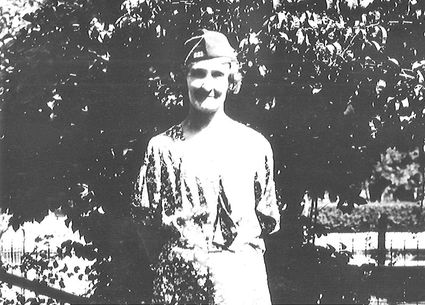Looking back
The Spirit of Tehachapi

Carrie Downs, first American Legion Auxiliary Unit 221 President. Her son Thomas Downs was the first Commander of American Legion Post 221.
Four Score and Five years ago the American Legion Auxiliary, Unit 221 was founded in the small city of Tehachapi. To set the scene I take you back to the spring of 1932. Herbert Hoover was still President but would be soundly defeated by Franklin Roosevelt in November of that year. The depression was in full swing – money was tight-- and one of the songs of that period was, "Brother, can you spare a dime?" There were soup kitchens to feed the homeless and men, many of them being veterans of World War I, would be seen "riding the rails" on freight trains looking for work.
Still, the citizens of our small town were making the most of "hard times" taking care of one another. To this scene, on May 25, 1932, a group of local women gathered together in the new City Hall for the purpose of establishing an American Legion Auxiliary Unit. It's main function then, as now, is to care for disabled veterans of all wars and conflicts and to assist veterans to regain a place in civilian life. It was a distinct advantage to the American Legion Post 221 to have the industrious women working for the same reasons. The Legion Post had been chartered on August 1, 1920 and was one of the earlier posts in the District.
Local woman, Isabelle Powers, wife of Wesley Powers, the 1932 Legion Commander, was appointed to take charge of organizing the Unit. It was through her perseverance and determination that the Unit was organized. The application for the Charter is dated June 14, 1932 and the permanent Charter is dated June 27, 1932.
Mrs. Carrie Downs was chosen to be the first President of Unit 221. Members thought it fitting as her son, Thomas Downs, had been the first American Legion Commander when the Post was chartered. The sixteen original Auxiliary Charter members are as follows: Lucinda (Callie) Brite, Nora Brite, Tilla Cronick, Carrie Downs, Kate Duty, Nancy Haigh, Maud Jenkins, Helen Keeley, Sophie Keeley, Belle Krueger, Idona Leiva, Marjorie Nelson, Isabelle Powers, Vivian Robison, Margaret Watts and Sarah Woods.
The fledgling unit, the youngest in the county at that time, tested its wings during the summer months organizing details such as the appointing of committee chairman, setting up meeting dates, seeking new members as well as assisting with social and civic affairs. Their membership included women from Mojave as did the Tehachapi Legion Post. The membership was joint until the chartering of Golden Queen Post # 358.
The Auxiliary's first public function was a Memorial Day Ceremony on May 30 of that year, even before the Charter had been finalized. Memorial Day, then known as Decoration Day, was commemorated by a service followed by members visiting both cemeteries with floral tributes and the placing of flags.
Later on, the same year, in November, the Armistice Day Service –later called Veterans' Day-was held. Since it commemorated the signing of the Armistice between Germany and the Allied Nations in 1918, on the eleventh hour on the eleventh day of the eleventh month, the service, today still follows the same time tradition.
This particular year, 1932, for Armistice Day, November 11, the Post and Unit requested a ten piece military band flown here from March Field, (later, March Air Force Base). Most of the town's population would be present. The band played for a capacity crowd and also for a dance that evening at the Legion Hall on E Street, just across from the former Wells Elementary School building. The same night the Auxiliary served a dinner for the band, the pilots and certain enlisted men who came with the band. The next day the pilots performed a daring air show for local residents before returning to their base.
In August of that year the Auxiliary sponsored a Candidates' Ball at the Legion Hall for Congressional and Assembly candidates. Running for Congress was Roland Curran and Assembly candidates were Incumbent Fred Patterson, George McClintock and a Tehachapi favorite, Judge Ferd Snyder. One of our city streets bears his name. Mrs. Vemba Carmack, President of Bakersfield Unit 26, was also present. One may deem such information trivial but a trip to or from Bakersfield was forty-five miles over narrow curvy U.S. Highway 466. Today, what we now call the "old" road that starts with Woodford-Tehachapi Road and moves down to Keene, was not yet even constructed. The "old, old" road was narrow and a bit dangerous. Consequently, if someone drove to Bakersfield the Tehachapi News listed it in the personal column. Really.
Those early thirties were red letter days for the small community and a hospital was established by Doctors Madge and Harold Schlotthauer. They were called by the whole town, Dr. Madge and Dr. Harold. Then, too, a high school was built with Orris S. Imhof as Principal. Formerly, if a Tehachapi student went to high school, they must live in Bakersfield or Lancaster in a boarding facility.
The Annual American Legion and Auxiliary Convention in 1932 was held in Oakland, California with thousands attending from other parts of the state. Post 221 and Unit 221 were both represented with Mr. and Mrs. Clyde (Nora) Brite and Mr. and Mrs. Art (Helen) Keeley attending. A highlight of the convention was the presence of the United States Naval Fleet with 10,000 officers and men aboard. The battleships were especially ordered to be there by President Hoover. There were aerial exhibits, drill teams, rifle and pistol matches and golf tournaments. Later on, back at the Auxiliary meeting Helen and Nora Brite would give a glowing report to the membership about the convention.
Two important highlights of that early convention was the request from those attendees to Congress that the 18th Amendment (Prohibition) be repealed. Also, a firm request was voiced as to the payment of the Soldiers/Sailors World War I bonus, promised to them for their service. Congress was willing to pay but wanted to wait until 1945 to do so. The 18th Amendment was repealed by the 21st Amendment in 1933. Prohibition had ended. Unfortunately, it took a veterans March on Washington and some violence to be incurred before the issue came to terms. In 1936 the bonus was paid. (I don't know how much my father's bonus was but he bought our family a beautiful piano for seventy-five dollars. It's still in the family home. People chided him for "wasting" his money on a piano when he could have put extra food on the table instead. He told them, "I would never let my family starve but I might not get seventy-five dollars all at once again for a long time." The piano was a good buy.)
Getting back to that first year of the"four score and five," the Auxiliary Unit 221 doubled its membership by 1933. Those "gung ho" ladies were there for Thanksgiving and Christmas baskets for local needy residents who were ill or out of work. ( Gung ho, of course, was a term to be used in another war, yet to come.)
The new Unit was making itself known for a Department Citation was received paying tribute to the Auxiliary for their accomplishments. Exact wording: "It is highly proper that the Department of California should pay tribute to the industry and accomplishments of Tehachapi Unit 221" The members referred to their effort as "over the top." Today's Auxiliary Units say "they made the membership goal."
To be continued.




